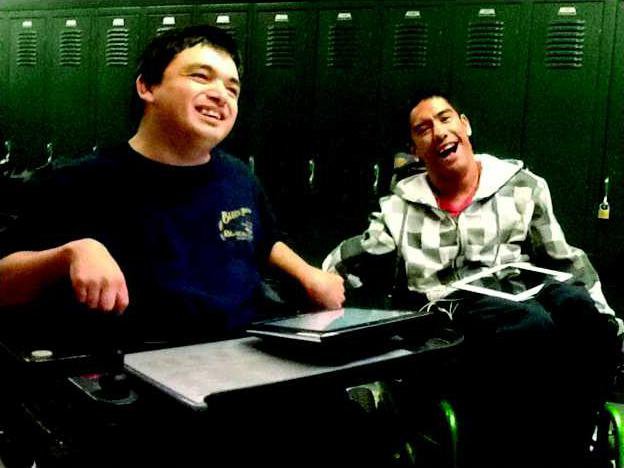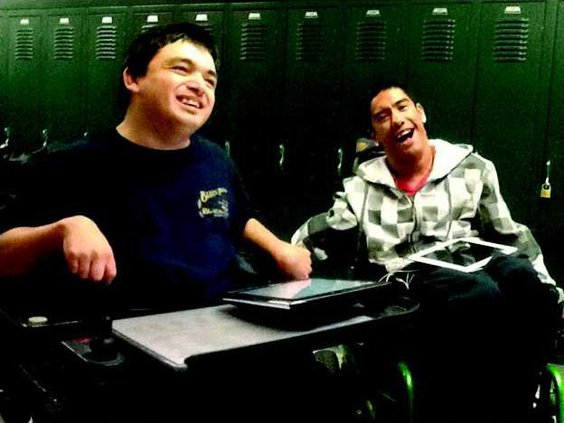Even though the iPad was a godsend for Eric Zamora, he needed a more sophisticated communications device. And when he recently learned that his dream was coming true, he offered to donate the iPad to another person with disabilities.
Zamora has spastic quadriplegic cerebral palsy; he donated the iPad to Harley Vargas, a Great Bend High School student who also has cerebral palsy. Both are Sunflower Diversified Services clients.
“Harley has a job in the community and can really benefit from this iPad for communication,” said Glennda Drescher, Sunflower service coordination director and chief marketing officer. Eric asked to donate to Harley because he has a generous heart.”
Janet Thurow, GBHS teacher, collaborated with Sunflower so the gift could be presented. “Janet and the high school were so cooperative,” Drescher said. “She was Eric’s teacher and now is Harley’s; she understood the importance of the donation to both young men.”
While Vargas is making use of the iPad, Zamora is now equipped with an upscale augmentative communication device called the DynaVox Maestro.
“We had originally sought help from Medicaid for the Maestro but were refused,” Drescher said. “Then, after the Sunflower Foundation bought Eric’s iPad, we were asked if we wanted to be a test case for people who need devices that were not approved by Medicaid. Eric agreed and I was more than willing.
“Now, almost two years later, Eric has what he needs,” Drescher added. “And it is so gratifying that Harley is benefitting too.”
Cindy Jones, referral expert at Southeast Kansas Independent Living at Wichita, contacted Drescher about being involved in the test case. “She was working with parents and professionals because we had all been denied this technology for our clients or loved ones.
“This collaborative effort means that more people have access to sophisticated technology,” Drescher noted. “Officials now understand that this can enhance lives and all of us at Sunflower appreciate it.”
One big advantage of the Maestro is its durability. People with disabilities sometimes have poor coordination, which increases the risk of a device such as the iPad being broken, Drescher explained.
“Replacement costs could be prohibitive,” she commented.
Another highlight is called “eye gaze.” The Maestro will read aloud using only the speakers’ eye movements as they look at information.
“Eric has not been approved for eye gaze because he is physically able to type,” Drescher said. “He will qualify for it only if his cerebral palsy progresses.”
However, Drescher noted, a Sunflower client who passed away last November, was making great progress with the Maestro eye gaze feature.
“We knew she was bright,” Drescher commented. “But she was raising eyebrows because no one knew she could read. Her parents didn’t even know. It is heartbreaking that she didn’t live longer to enjoy this rewarding experience and to tell us more.”
The device she was using is being transferred to another Sunflower client who cannot speak or type but can read.
“This is such amazing technology,” Drescher said. “Sunflower will do everything we can to make it available to those who need it. How can anyone deny another person the opportunity to have a voice?”
Sunflower, a non-profit agency, serves infants, toddlers and adults with developmental disabilities and delays in Barton, Pawnee, Rice, Rush and Stafford counties.
Sunflower client shares gift of technology





